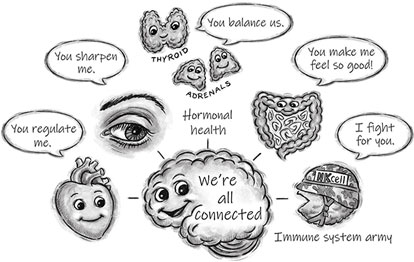How Chronic Stress Causes Chronic Diseases
Many serious illnesses begin with stress in the brain, especially diseases of the heart, gut, thyroid, and immune system. Here’s a head-to-toe story of how stress management is self-care for the brain and body.
Excess stress releases sticky stuff. During a normal stress response, biochemicals such as cortisol, epinephrine, and glucagon raise blood sugar levels, which gives the body more fuel. If your blood sugar stays high for longer than you need it, instead of being used by your muscles, the extra gets stored as fat or gets “glycated” (sticky) and deposited onto tissue as AGEs (advanced glycation end-products)—biochemical jargon for gumming up the workings of your body and brain.
Excess stress causes a neurotic heart. Chronic unresolved stress increases blood pressure and heart rate and narrows coronary blood vessels. Eventually, these stress-related changes, especially high blood pressure, can wear out your heart.
The higher the pressure of the blood flowing through your vessels, the higher the force it exerts on the lining—sort of like how heavy trucks exert more wear and tear on the road. This can cause tears, or potholes, where sticky stuff collects more easily, setting you up for cardiovascular disease. Your immune system interprets this sticky stuff as foreign material and mobilizes the repair troops to “fix it.” The problem is it’s often not fixed and sometimes over-repaired, leading to more sticky-stuff buildup and clots, hallmarks of atherosclerosis (thickened arterial walls with bumpy plaques on the lining).
More stress-causing sticky stuff. During the stress response, epinephrine makes circulating platelets more likely to clump together. These clumps of sticky stuff are more likely to collect in your blood vessels, especially around tears in the lining from high blood pressure, and cause atherosclerosis.
Excess stress causes pains in the gut. See the relationship between stress and gut health, page 92 of The Healthy Brain Book.
Excess stress weakens your immune system. Ever wonder why you get sick when you feel down? Because your head brain and gut-brain (where much of your immune system resides) are so interdependent, what one feels affects the other. The neurochemicals from unresolved emotional stress don’t stay in the brain. They get into the bloodstream and travel throughout your body, where they dial down the immune system, making it less smart. Sometimes it fails to attack an invading germ and you get a cold. Sometimes it gets confused and attacks your body’s own tissues—as happens in autoimmune diseases. This is also called inflammation imbalance: the immune system remains inflamed, continuing to fight even after the battle is won, which causes wear and tear on the body.
Besides making antibodies against germs, your immune system helps you heal from illnesses. Because stress redirects energy away from the immune system, mobilizing it to help you handle stress, it deprives your body of what it needs to heal.
Continued high-stress hormone levels are one reason chronically anxious people suffer more autoimmune illnesses. Remember, keeping your brain in balance helps keep your immune system in balance.

Excess stress can contribute to cancer. One of the other things the immune system does is search and destroy tumor cells. When stress suppresses the size of the immune system army, lowering the number of killer cells, it’s just the opposite of what the body needs to prevent and fight cancer. And tumors love to be fed by the stress response’s high levels of circulating glucose. This may help explain why “cancer fighters” who take charge of their disease and are optimistic about beating it more often do so, compared to those who are depressed and negative and give up. (See related section, “How the Belief Effect Benefits Your Brain,” page 156 of The Healthy Brain Book.)
Excess stress makes you physically weak. The immune system isn’t the only thing stress weakens—it weakens your physical body, too. Chronic high levels of stress hormones can break down muscle protein (stress hormones are looking for any tissues to extract energy from), leading to muscle fatigue; hence the current epidemic of feeling tired and in pain due to fibromyalgia.
Dr. Sears, or Dr. Bill as his “little patients” call him, has been advising busy parents on how to raise healthier families for over 40 years. He received his medical training at Harvard Medical School’s Children’s Hospital in Boston and The Hospital for Sick Children in Toronto, the world’s largest children’s hospital, where he was associate ward chief of the newborn intensive care unit before serving as the chief of pediatrics at Toronto Western Hospital, a teaching hospital of the University of Toronto. He has served as a professor of pediatrics at the University of Toronto, University of South Carolina, University of Southern California School of Medicine, and University of California: Irvine. As a father of 8 children, he coached Little League sports for 20 years, and together with his wife Martha has written more than 40 best-selling books and countless articles on nutrition, parenting, and healthy aging. He serves as a health consultant for magazines, TV, radio and other media, and his AskDrSears.com website is one of the most popular health and parenting sites. Dr. Sears has appeared on over 100 television programs, including 20/20, Good Morning America, Oprah, Today, The View, and Dr. Phil, and was featured on the cover of TIME Magazine in May 2012. He is noted for his science-made-simple-and-fun approach to family health.

